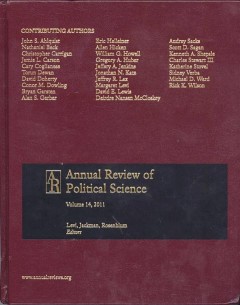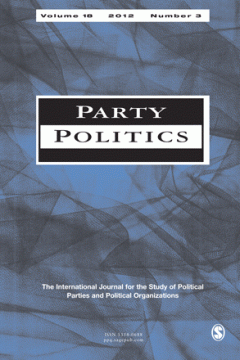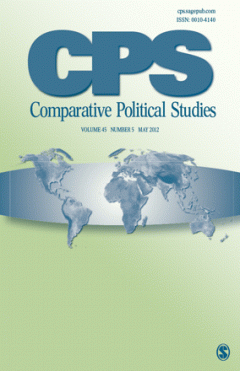Filter by

The Rhetoric Revival in Political Theory
The recent wave of interest in the rhetorical tradition among political theorists can be attributed partly to the rise of theories of deliberative democracy, which focused attention on communication and discourse. Some scholars see in rhetoric a way to challenge the assumptions of Habermasian deliberative theory, while others aim to integrate rhetoric into a broader theory of deliberation. Insi…
- Edition
- Volume 14, 2011 p. 159–180
- ISBN/ISSN
- 10942939
- Collation
- p. 159–180
- Series Title
- Annual Review of Political Science
- Call Number
- -

The Rhetoric of the Economy and the Polity
The Great Recession is not the end of capitalism. An innovative economy makes mistakes, but that is not a good reason to regulate it out of its innovations. The innovations�not unions or regulation�have increased real income per head by a factor of 100 in the places that have adopted bourgeois liberty and dignity. An innovative economy is �rhetorical� because, if our economic lives are not froz…
- Edition
- Volume 14, 2011 p. 181–199
- ISBN/ISSN
- 10942939
- Collation
- p. 181–199
- Series Title
- Annual Review of Political Science
- Call Number
- -

The Contribution of Behavioral Economics to Political Science
Behavioral economics has become an important part of the economics profession. As a subfield, it tries to make sense of persistent violations of the standard model for economics. The major classes of violations involve social preferences (taking the well-being of others into account), time discounting (inconsistencies in valuing present and future commodities), and context (the effects of frami…
- Edition
- Volume 14, 2011 p. 201–223
- ISBN/ISSN
- 10942939
- Collation
- p. 201–223
- Series Title
- Annual Review of Political Science
- Call Number
- -

The Causes of Nuclear Weapons Proliferation
This critical review of the new political science literature on the causes of nuclear weapons proliferation consists of seven parts. The first section briefly presents what we know about which states developed nuclear weapons and which states started but abandoned weapons development programs. I highlight the problems that result from uncertainty about the accuracy and completeness of the data.…
- Edition
- Volume 14, 2011 p. 225–244
- ISBN/ISSN
- 10942939
- Collation
- p. 225–244
- Series Title
- Annual Review of Political Science
- Call Number
- -

Network Analysis and Political Science
Political science is fascinated with networks. This fascination builds on networks' descriptive appeal, and descriptions of networks play a prominent role in recent forays into network analysis. For some time, quantitative research has included node-level measures of network characteristics in standard regression models, thereby incorporating network concepts into familiar models. This approach…
- Edition
- Volume 14, 2011 p. p. 245–264
- ISBN/ISSN
- 10942939
- Collation
- p. 245–264
- Series Title
- Annual Review of Political Science
- Call Number
- -

The Big Five Personality Traits in the Political Arena
Recent political science research on the effects of core personality traits�the Big Five�contributes to our understanding of how people interact with their political environments. This research examines how individual-level variations in broad, stable psychological characteristics affect individual-level political outcomes. In this article, we review recent work that uses the Big Five to predic…
- Edition
- Volume 14, 2011 p. 265-287
- ISBN/ISSN
- 10942939
- Collation
- p. 265-287
- Series Title
- Annual Review of Political Science
- Call Number
- -

Clientelism
Clientelism is characterized by the combination of particularistic targeting and contingency-based exchange. This method of contingent exchange thrives in both autocracies and democracies. It exists in a large variety of cultural contexts. Confronted with economic development, clientelism fades away in some political contexts but adapts and survives in others. This article explores our understa…
- Edition
- Volume 14, 2011 p. 289–310
- ISBN/ISSN
- 10942939
- Collation
- p. 289–310
- Series Title
- Annual Review of Political Science
- Call Number
- -

Political Economy Models of Elections
We review a large formal literature on economic models of voting and electoral politics. We discuss two broad classes of model: those focusing on preference aggregation and those that look at elections as mechanisms of information aggregation. We also explore the role of elections in situations of asymmetric information, where politicians take hidden actions or are otherwise better informed abo…
- Edition
- Volume 14, 2011 p. 311–330
- ISBN/ISSN
- 10942939
- Collation
- p. 311–330
- Series Title
- Annual Review of Political Science
- Call Number
- -

Modeling Dynamics in Time-Series–Cross-Section Political Economy Data
This article deals with a variety of dynamic issues in the analysis of time-series�cross-section (TSCS) data. Although the issues raised are general, we focus on applications to comparative political economy, which frequently uses TSCS data. We begin with a discussion of specification and lay out the theoretical differences implied by the various types of dynamic models that can be estimated. I…
- Edition
- Volume 14, 2011 p. 331-352
- ISBN/ISSN
- 10942939
- Collation
- p. 331-352
- Series Title
- Annual Review of Political Science
- Call Number
- -

Voting Technologies
A renewed, energetic interest in voting technologies erupted in political science following the 2000 presidential election. Spawned initially by the recount controversy in Florida, the literature has grown to consider the effects of voting technologies on the vote choice more generally. This literature has explained why localities have the voting technologies (lever machines, punch cards, etc.)…
- Edition
- Volume 14, 2011 p. 353-378
- ISBN/ISSN
- 10942939
- Collation
- p. 353-378
- Series Title
- Annual Review of Political Science
- Call Number
- -

Policy-seeking parties in multiparty systems: Influence or purity?
According to the standard policy-seeking model of party behaviour, a party should always want to join a coalition if its inclusion would decrease the policy distance between the party and the winning coalition. However, in multiparty systems where no party has a majority, policy influence always comes at a cost to the party�s preferred policy. A party has to moderate its own policy principles i…
- Edition
- Volume 18, Number 3, May 2012 p. 297-314
- ISBN/ISSN
- 1354-0688
- Collation
- p. 297-314
- Series Title
- Party Politics
- Call Number
- -

New party organization in Western Europe: Of party hierarchies, stratarchies …
Scholarly work on models of party organization tends to treat stratarchy and hierarchy as analytical opposites. Based on two different visions of stratarchy that co-exist in the literature, this article presents a threefold typology locating party stratarchy as a model between party hierarchy, as one counter-image, and party federation, as the other. The types differ in the extent to which core…
- Edition
- Volume 18, Number 3, May 2012 p. 315-336
- ISBN/ISSN
- 1354-0688
- Collation
- p. 315-336
- Series Title
- Party Politics
- Call Number
- -

One-party rule or multiparty competition? Chinese attitudes to party system a…
This article tests multifactor explanations for variance among Chinese citizens' attitudes to two related but separable party system concepts: the appropriateness of the current one-party system for China today, and the more abstract notion that multiple parties lead to chaos. Using data from The China Survey, conducted with a nationwide sample in 2008, the authors find that feelings of satisfa…
- Edition
- Volume 18, Number 3, May 2012 p. 337-347
- ISBN/ISSN
- 1354-0688
- Collation
- p. 337-347
- Series Title
- Party Politics
- Call Number
- -

Multi-party governance: Managing the unity-distinctiveness dilemma in executi…
In democracies where no party enjoys a parliamentary majority, various multi-party governance arrangements have evolved to accommodate the respective interests of the parties involved. Such arrangements reflect, among other things, the political imperatives facing the parties in question, in particular the quest for an effective and durable government (which typically requires significant inter…
- Edition
- Volume 18, Number 3, May 2012 p. 349-368
- ISBN/ISSN
- 1354-0688
- Collation
- p. 349-368
- Series Title
- Party Politics
- Call Number
- -

Scripture, structure and the formation of Catholic parties: The case of Venez…
What accounts for the virtual absence of new Catholic parties in Latin America over the past four decades? From the late nineteenth to the mid-twentieth centuries, Catholic activists organized a variety of political parties in the region. Yet since the 1970s, despite the dramatic expansion of political opportunities in Catholic-majority countries, Catholicism has played only a marginal role in …
- Edition
- Volume 18, Number 3, May 2012 p. 369-390
- ISBN/ISSN
- 1354-0688
- Collation
- p. 369-390
- Series Title
- Party Politics
- Call Number
- -

Financing democracy in Japan: The allocation and consequences of government s…
In 1994, the Japanese Diet implemented a system of public assistance for political parties which many hoped would encourage party-centred rather than candidate-centred campaigns. This study examines some of the consequences of this system for party organizations and politicians. Using data culled from official subsidy and campaign finance reports, two empirical questions are addressed: first, h…
- Edition
- Volume 18, Number 3, May 2012 p. 391-408
- ISBN/ISSN
- 1354-0688
- Collation
- p. 391-408
- Series Title
- Party Politics
- Call Number
- -

From local to national: Explaining the formation of the Australian Green Party
The rise of green parties in Australia follows a path that is well documented in the literature; the inability of other parties to accommodate environmental concerns, the increasing salience of green issues for governments and an electoral regime that permits party insurgency. This article examines how these factors have operated in Australia, and the extent to which a distinctive federal struc…
- Edition
- Volume 18, Number 3, May 2012 p. 409-425
- ISBN/ISSN
- 1354-0688
- Collation
- p. 409-425
- Series Title
- Party Politics
- Call Number
- -

Factions with clout: Presidential cabinet coalition and policy in the Uruguay…
We investigate bill passage by party factions in Uruguay and show that those joining cabinet coalitions earn policy influence. The policy advantage of coalition is therefore not collected by the president alone, as often implied: partners acquire clout in law-making and use it to pass bills of their own and to strike deals with outside factions. Analysis of all bills initiated between 1985 and …
- Edition
- Volume 18, Number 3, May 2012 p. 427-451
- ISBN/ISSN
- 1354-0688
- Collation
- p. 427-451
- Series Title
- Party Politics
- Call Number
- -

Does Cheating Pay? The Effect of Electoral Misconduct on Party Systems
This article examines the effect of electoral misconduct on party systems in new electoral regimes. The authors distinguish between different forms of electoral misconduct and argue that preelection tools�which aim to deter opposition parties and their supporters and create a biased information environment�exert a �psychological� effect on parties and voters, whereas ballot fraud exerts a direc…
- Edition
- Volume 45, Number 5 May 2012 p. 575-605
- ISBN/ISSN
- 0010-4140
- Collation
- p. 575-605
- Series Title
- Comparative Political Studies
- Call Number
- -

Who Fears What? Explaining Far-Right-Wing Preference in Europe by Distinguish…
This contribution aims, first, to determine whether support for the far right is based on perceptions of cultural or economic threats posed by immigrants in 11 European countries. Second, it seeks to reanalyze the question of whether class is an important explanation for support for the far right using new measures of class and, related to this, to determine the extent to which class interacts …
- Edition
- Volume 45, Number 5 May 2012 p. 547-574
- ISBN/ISSN
- 0010-4140
- Collation
- p. 547-574
- Series Title
- Comparative Political Studies
- Call Number
- -
 Computer Science, Information & General Works
Computer Science, Information & General Works  Philosophy & Psychology
Philosophy & Psychology  Religion
Religion  Social Sciences
Social Sciences  Language
Language  Pure Science
Pure Science  Applied Sciences
Applied Sciences  Art & Recreation
Art & Recreation  Literature
Literature  History & Geography
History & Geography